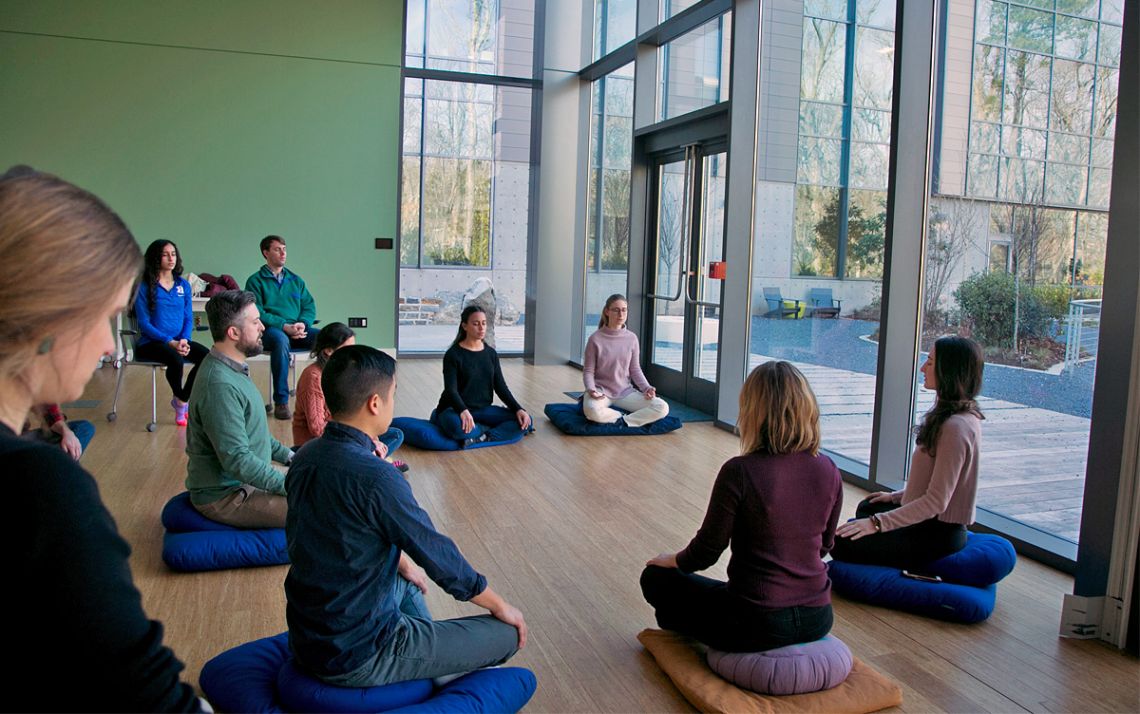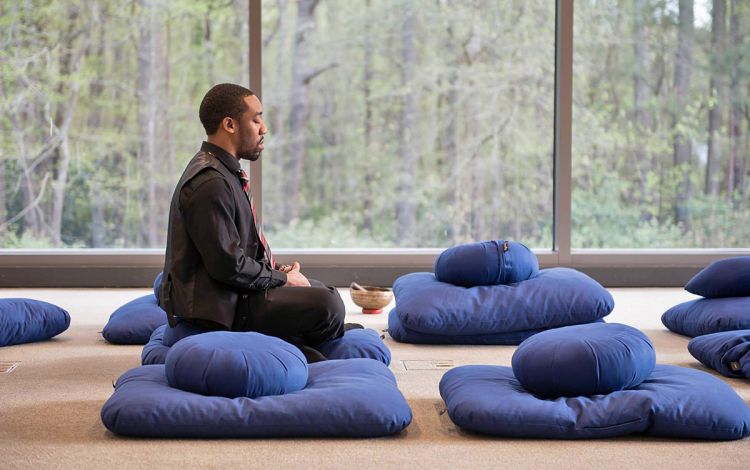What Kind of Meditation Will Work for You?
Find out how to get started with different practices in the Duke community

Cindy Canty-Dumas never thought she’d be someone who meditates. As an outgoing and energetic person, the administrative specialist in the Office of the Duke University Chancellor for Health Affairs, the idea of sitting quietly wasn’t something that seemed doable.
 But since first trying meditation in 2018, Canty-Dumas takes time nearly every day – either by herself or through programs provided at no charge through DuWell – to engage in Koru mindfulness or guided meditation sessions.
But since first trying meditation in 2018, Canty-Dumas takes time nearly every day – either by herself or through programs provided at no charge through DuWell – to engage in Koru mindfulness or guided meditation sessions.
“I had to come to it kicking and screaming,” Canty-Dumas said. “I’m normally so leveled up, I didn’t think it would be an option for me. But it is an option. It’s a viable option for anyone trying to bring their life into some sort of balance.”
Across Duke, there are several types of in-person or virtual meditation practices available for staff, faculty, and students who want to slow down, feel better, and relieve some stress from busy, connected daily lives.
Tom Szigethy, Duke associate dean of students and director of DuWell and a co-convener for Healthy Duke, said that in the stillness and quiet of meditation, you work parts of your brain that aren’t often as active during hectic days. And by focusing on breathing, letting your mind wander without judgement, and then gently reining it back in to focus on breathing again can strengthen your ability to focus.
“Research tells us that people who meditate regularly have increased immune systems, they have a greater ability to manage stress, to remain focused and they have a higher level of self-compassion,” Szigethy said.
For someone who may be new to meditation, here’s what can you expect from each type of practice:
Guided Meditation
 Each Thursday during the spring semester, students, staff and faculty can take part in free guided meditation sessions on Zoom or in-person at the Duke Student Wellness Center. Sessions feature a facilitator who leads participants through breathing exercises and journeys of the imagination that can create specific emotional responses.
Each Thursday during the spring semester, students, staff and faculty can take part in free guided meditation sessions on Zoom or in-person at the Duke Student Wellness Center. Sessions feature a facilitator who leads participants through breathing exercises and journeys of the imagination that can create specific emotional responses.
Szigethy said that guided meditation is a helpful way for people who are new to meditation to learn skills that they can take into their own life.
“If the meditation is focused on safety and peacefulness, then the facilitator will guide the group to imagine themselves in a place that provide peace and safety,” he said. “The more that we think about it, the easier it will be to imagine ourselves in that location. The more we can do that through meditative practice, the more we can gain the benefits of being in that type of environment, even though we aren’t in it.”
Canty-Dumas, the administrative specialist in the Office of the Duke University Chancellor for Health Affairs, likes guided meditation because it allows her to relax, relinquish control, and let someone else lead her meditation journey.
“The structure of guided meditations really speaks to me because I just have to be there, I just have to show up,” she said. “I don’t have to think about what’s going to happen. I just have to show up with the intention to sit still and follow along with what someone else is offering me.”
Koru Mindfulness
In the mid 1990s, a small circle of psychiatrists and social workers developed an approach to meditation specifically aimed at the challenges college students face. They named the mindfulness practice “Koru,” which is a word from the Maori people of New Zealand that means balanced growth. The idea behind it is to expose participants to a range of breathing exercises and meditation practices so they can learn which one is most effective for them.
“The idea is that they start using those meditations to practice during the week and see what they gravitate toward, which ones they like and which ones they don’t,” Szigethy said. “This way they can easily learn a little bit about meditation and how it can affect the way that they’re living.”
Several times each semester, DuWell offers a free four-week program of 75-minute virtual Koru Mindfulness classes for Duke students, staff and faculty. Students can take part in more advanced, in-person Koru 2.0 classes or a once-a-semester Koru retreat.
Buddhist Meditation
Francesca Morfesis, the Buddhist chaplain at Duke, points out that meditation practices familiar to many people have their roots in Buddhist traditions.
“There are many Buddhist meditation practices,” Morfesis said. “The Buddhist lineage is 2,500 years old and has a lot of branches. There are traditions coming out of Korea, out of China and out of Thailand. And now we have this expression in the West.”
The Buddhist Meditation Community at Duke draws on a variety of traditions and incorporates self-compassion, mindful movement and sitting, as well as visualization practices to help participants be more present to their surroundings, thoughts and feelings.
Everyone in the Duke community is welcome to join a free Zoom-based meditation session each Thursday morning. For information on how to join, contact Morfesis at francesca.morfesis@duke.edu.
Yoga Meditation
While some meditation practices are focused mainly on the mind, yoga incorporates the body into the practice. Yoga often incorporates stretches and body positions to bring the body into harmony with the mind.
“Yoga was developed as an attempt to allow all that stress to be worked out of the muscles so you’re better able to settle into a meditation,” Szigethy said. “It’s turned into an exercise where people go out and do yoga, but it’s really trying to set you up to be calmer in your own meditation.”
There are free in-person yoga classes for students, faculty and staff on Mondays and Tuesdays during the spring semester at the Student Wellness Center. The Duke Health & Fitness Center offers virtual and in-person yoga classes for members and non-members for $15 per class.
Bringing it All Together
Incorporating some of the ideas and practices of Buddhist meditation with strategies for combatting stress, Mindfulness-Based Stress Reduction has been offered at Duke since 1998.
Duke Health & Well-Being, an entity comprised of Duke Health & Fitness Center, Duke Integrative Medicine and Duke Lifestyle & Weight Management Center, offers a quarterly eight-week program in Mindfulness-Based Stress Reduction.
The curriculum, which is currently virtual due to COVID-19, covers nine weekly sessions and one weekend. Duke staff and faculty receive a 15 percent discount on the registration fee.
“Mindfulness, at its core, is the act of helping cultivate the natural capacity that we’ve already got for awareness of what’s happening, objectively in the present moment,” said Katie Strobush, a program coordinator with Duke Health & Well-Being. “It’s the ability to train your attention to the here and now. And from that awareness, you can get the ability to train your attention, your concentration, and make more informed choices and decisions.”
Send story ideas, shout-outs and photographs through our story idea form or write working@duke.edu.